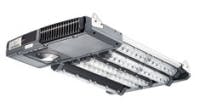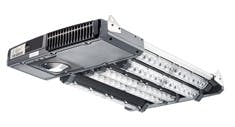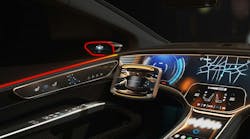Meanwhile, the company has announced that Mutual Logistics will install Digital Lumens LED lighting and software in Le Mans and Bourg-en-Bresse, where it expects to reduce energy use by 91%.
Patent details
US Patent #8,232,745 describes details of the company’s Intelligent Lighting System (ILS) software, which allows centrally optimized lighting levels throughout a facility using LED-based fixtures, integrated occupancy and daylight sensors, and wireless networking. The system uses open standard protocols such as Zigbee and Ethernet networking, but with proprietary software at the application level. “That’s almost the way you have to go forward, because we don’t have broad end to end solutions - there’s open network standards but there’s no emergent lighting standard at the application layer yet,” said Chemel.
The company’s LightRules software allows real-time, web-based reporting to optimize energy savings and lighting levels – from the facility level down to the fixture level. “The software is actually watching what’s happening in the facility and continually generates a history of occupancy events and energy usage over time. We’re able to use that history to automatically optimize of the lighting system,” said Chemel.
Chemel further explained how cost has been driven out of the overall control system. “If we look at the major cost savings that customers are getting, it comes from four areas: occupancy sensing, task tuning, daylight harvesting and scheduling.” Task tuning refers to the digital setting of light levels to deliver only the foot candles needed for the task at hand. Each of these areas contributes to overall energy savings.
Digital Lumens has also reduced cost through its vertically integrated approach. The company manufactures its own luminaires, integrates the solid-state sensors, and adds its own wireless networking and controls. In traditional lighting controls systems, where sensors and control modules are purchased individually from different suppliers, the cost can be much higher.
When it comes to industrial applications, often hundreds or even thousands of lighting fixtures need to be controlled. “Installing the fixtures and providing real-time facility monitoring is a very challenging networking problem and this is outside the scope of where a lot of folks are working in wireless lighting control,” commented Chemel.
This particular patent was expedited under the Green Technology Pilot Program, a US program designed to focus on technologies that enabled real energy savings. The program allowed one way of relieving the backlog of US patents, which at times could take 3-4 years for review and approval. Though this program is no longer accepting applications, a number of patents have been expedited to address the country’s energy usage.
Mutual Logistics installation
JC Lampes will replace 400W high-intensity discharge (HID) fixtures with a mix of the Digital Lumens 13,000-lm and 18,000-lm fixtures. Mutual Logistics will also use LightRules lighting management system in both facilities to fine tune lighting settings, and provide daily reporting. Distributed control of the smart LED lighting system is expected to reduce energy cost by 91%.
“With a goal of reducing our energy demand, we considered a variety of options before selecting the Digital Lumens Intelligent Lighting System,” said Vincent Denis, president of Mutual Logistics. “The systems-based approach to LED lighting in our facilities gives us unmatched energy savings and maximum control over our environment, as well as additional visibility into our daily operations.”
“We are honored that Mutual Logistics is deploying our Intelligent Lighting System in their state-of-the-art facilities,” said Tom Pincince, president and CEO of Digital Lumens. “As we expand our global footprint, we are very glad that our solutions are delivering real value to customers in a variety of industries and countries worldwide.”






